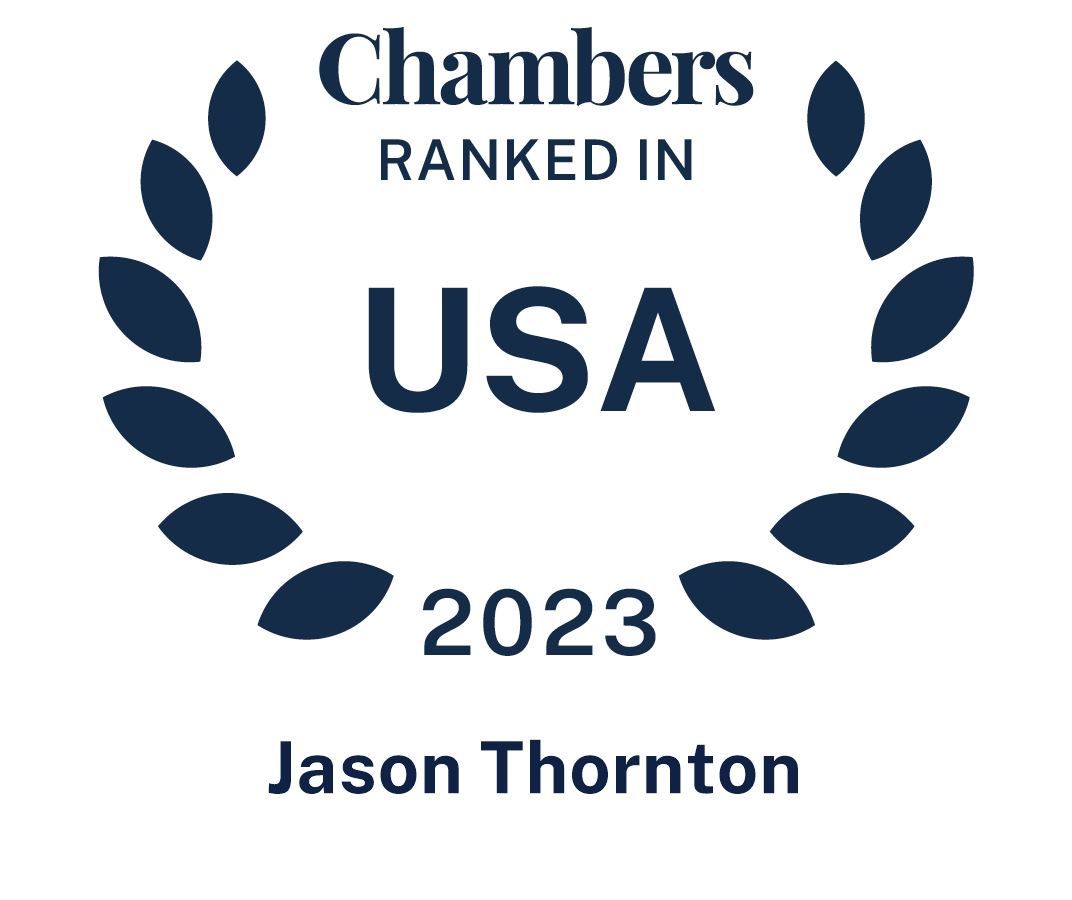
Jason R. Thornton
Partner
Jason credits over twenty years of near exclusive construction industry focus on private and federal, state, and local projects among the keys to his successful litigation practice. Always contemplating creative solutions that will deliver the greatest value to the firm’s clients, Jason is expert in all aspects of mediation, arbitration, trials, civil writs, and appeals.
Smart prime contractors and subcontractors understand the legal and business benefits that accrue by having Jason Thornton in their corner. Others sometimes learn the hard way that not all construction lawyers are alike. Jason credits more than twenty years of near exclusive construction industry focus on private and federal, state, and local projects among the keys to his successful litigation practice. Owners, presidents, vice presidents, and operations and project managers faced with delay, disruption, inefficiency, and extra work claims, contract disputes, and bid protests rely on his proven counsel. Always contemplating creative solutions that will deliver the greatest value to the firm’s clients, Jason is expert in all aspects of mediation, arbitration, trials, civil writs, and appeals.
Another of Jason’s great strengths is his ability to help clients minimize risk through a variety of dispute avoidance strategies. Early intervention is critical. Comprehensive knowledge of construction law, industry practices, and company operations empowers Jason to provide informed legal advice and recommendations. His anticipation of future legal ramifications and business impacts is especially insightful — and is something frequently overlooked by less experienced attorneys. The unforeseen effects of making the wrong decision can have damaging consequences down the road.
Of special note, Mr. Thornton represented the appellants in three precedent-setting cases:
- Wagner Construction Company v. Pacific Mechanical Corporation (2007) 41 Cal.4th 19 [California Supreme Court agreed with Mr. Thornton’s position that the arbitrator, not court, decides statute of limitations defense]
- West Coast Air Conditioning Company, Inc. v. California Department of Corrections and Rehabilitation (2018) 21 Cal.App.5th 453 [Contractor may recover bid preparation costs under promissory estoppel theory even though it obtained an injunction because injunction was ineffective]
- San Diego Unified Port District v. Douglas E. Barnhart, Inc. (2002) 95 Cal.App.4th 1400 [in a construction case, the Fourth District Court of Appeal held the firm’s client could not be forced to pay for destructive testing requested by others]
Additionally, Jason represented the respondents in five important published opinions; the latter four of which upheld the framework for award of lease-leaseback contracts:
- Brewer Corporation, et. al. v. Point Center Financial, Inc. (2014) 223 Cal.App.4th 831
- McGee v. Balfour Beatty Construction, LLC (2016) 247 Cal.App.4th 235
- McGee v. Balfour Beatty Construction, LLC (Second Appeal) (2020) 49 Cal.App.5th 814
- California Taxpayers Action Network v. Taber Construction, Inc. (2017) 12 Cal.App.5th 115
- California Taxpayers Action Network v. Taber Construction, Inc. (2019) 42 Cal.App.5th 824
Jason also serves as general counsel for Finch, Thornton & Baird, LLP legal matters.
DELAY, DISRUPTION, AND INEFFICIENCY CLAIMS
Early assessment of the most practical strategies for handling claims is essential. Prolonged delays in resolving these matters can result in unnecessary project setbacks and expenses and weaken leverage. Jason excels in the prosecution and defense of delay, disruption, and inefficiency claims for both prime and subcontractors. Working closely with company owners and senior managers, he methodically prioritizes objectives and evaluates client business resources. Only then do his two decades of experience take over to assist Jason in pursuing the prompt recovery of monies owed or in avoiding payments on false or unfounded claims.
CONTRACT INTERPRETATION DISPUTES AND EXTRA WORK CLAIMS
Given the complex legal and regulatory environment that characterizes the construction industry generally, contract disputes between prime and subcontractors are unavoidable. Seemingly subtle differences of contract interpretation can have costly and profound implications; extra work claims are common. The expertise that Jason brings to the review and evaluation of contracts, plans, and general conditions is exhaustive and precisely directed. His advice and recommendations are candid and straightforward. No learning curve is required. So when the burden of paying — or receiving — hundreds of thousands or millions of dollars hangs in the balance, many of the firm’s clients seek Jason’s counsel.
BID PROTESTS
All too frequently, the call arrives mid-afternoon on a Friday. The bids have been opened and reviewed. A protest is warranted and due within days; necessary investigative work must begin immediately. With his thorough knowledge of specialized construction processes from beginning to project sign off, Jason doesn’t waste a moment. He knows exactly what to do. Been there, done that, many times over. The client’s last-ditch effort to secure a project award is in good hands.
- Construction litigation
- Public works of improvement and government contracts, including projects with local public agencies, cities, counties, state agencies, and the federal government
- Delay, disruption, inefficiency, and extra work claims
- Coordination with schedule, design, accounting, and subject matter experts on construction claims
- Foreclosure litigation
- Construction activity related to personal injury defense
- Mechanic’s liens
- Construction defect defense
- Requests for equitable adjustments (REAs)
- Contract Disputes Act claims
- Transactional matters specializing in the drafting and review of construction project agreements and public procurement compliance
- Local, state, and federal bid protests
- General business litigation
- Strategic counseling and compliance advice on general business, construction, and employment and labor issues
Smart prime contractors and subcontractors understand the legal and business benefits that accrue by having Jason Thornton in their corner. Others sometimes learn the hard way that not all construction lawyers are alike. Jason credits more than twenty years of near exclusive construction industry focus on private and federal, state, and local projects among the keys to his successful litigation practice. Owners, presidents, vice presidents, and operations and project managers faced with delay, disruption, inefficiency, and extra work claims, contract disputes, and bid protests rely on his proven counsel. Always contemplating creative solutions that will deliver the greatest value to the firm’s clients, Jason is expert in all aspects of mediation, arbitration, trials, civil writs, and appeals.
Another of Jason’s great strengths is his ability to help clients minimize risk through a variety of dispute avoidance strategies. Early intervention is critical. Comprehensive knowledge of construction law, industry practices, and company operations empowers Jason to provide informed legal advice and recommendations. His anticipation of future legal ramifications and business impacts is especially insightful — and is something frequently overlooked by less experienced attorneys. The unforeseen effects of making the wrong decision can have damaging consequences down the road.
Of special note, Mr. Thornton represented the appellants in three precedent-setting cases:
- Wagner Construction Company v. Pacific Mechanical Corporation (2007) 41 Cal.4th 19 [California Supreme Court agreed with Mr. Thornton’s position that the arbitrator, not court, decides statute of limitations defense]
- West Coast Air Conditioning Company, Inc. v. California Department of Corrections and Rehabilitation (2018) 21 Cal.App.5th 453 [Contractor may recover bid preparation costs under promissory estoppel theory even though it obtained an injunction because injunction was ineffective]
- San Diego Unified Port District v. Douglas E. Barnhart, Inc. (2002) 95 Cal.App.4th 1400 [in a construction case, the Fourth District Court of Appeal held the firm’s client could not be forced to pay for destructive testing requested by others]
Additionally, Jason represented the respondents in five important published opinions; the latter four of which upheld the framework for award of lease-leaseback contracts:
- Brewer Corporation, et. al. v. Point Center Financial, Inc. (2014) 223 Cal.App.4th 831
- McGee v. Balfour Beatty Construction, LLC (2016) 247 Cal.App.4th 235
- McGee v. Balfour Beatty Construction, LLC (Second Appeal) (2020) 49 Cal.App.5th 814
- California Taxpayers Action Network v. Taber Construction, Inc. (2017) 12 Cal.App.5th 115
- California Taxpayers Action Network v. Taber Construction, Inc. (2019) 42 Cal.App.5th 824
Jason also serves as general counsel for Finch, Thornton & Baird, LLP legal matters.
DELAY, DISRUPTION, AND INEFFICIENCY CLAIMS
Early assessment of the most practical strategies for handling claims is essential. Prolonged delays in resolving these matters can result in unnecessary project setbacks and expenses and weaken leverage. Jason excels in the prosecution and defense of delay, disruption, and inefficiency claims for both prime and subcontractors. Working closely with company owners and senior managers, he methodically prioritizes objectives and evaluates client business resources. Only then do his two decades of experience take over to assist Jason in pursuing the prompt recovery of monies owed or in avoiding payments on false or unfounded claims.
CONTRACT INTERPRETATION DISPUTES AND EXTRA WORK CLAIMS
Given the complex legal and regulatory environment that characterizes the construction industry generally, contract disputes between prime and subcontractors are unavoidable. Seemingly subtle differences of contract interpretation can have costly and profound implications; extra work claims are common. The expertise that Jason brings to the review and evaluation of contracts, plans, and general conditions is exhaustive and precisely directed. His advice and recommendations are candid and straightforward. No learning curve is required. So when the burden of paying — or receiving — hundreds of thousands or millions of dollars hangs in the balance, many of the firm’s clients seek Jason’s counsel.
BID PROTESTS
All too frequently, the call arrives mid-afternoon on a Friday. The bids have been opened and reviewed. A protest is warranted and due within days; necessary investigative work must begin immediately. With his thorough knowledge of specialized construction processes from beginning to project sign off, Jason doesn’t waste a moment. He knows exactly what to do. Been there, done that, many times over. The client’s last-ditch effort to secure a project award is in good hands.
- Construction litigation
- Public works of improvement and government contracts, including projects with local public agencies, cities, counties, state agencies, and the federal government
- Delay, disruption, inefficiency, and extra work claims
- Coordination with schedule, design, accounting, and subject matter experts on construction claims
- Foreclosure litigation
- Construction activity related to personal injury defense
- Mechanic’s liens
- Construction defect defense
- Requests for equitable adjustments (REAs)
- Contract Disputes Act claims
- Transactional matters specializing in the drafting and review of construction project agreements and public procurement compliance
- Local, state, and federal bid protests
- General business litigation
- Strategic counseling and compliance advice on general business, construction, and employment and labor issues
Jason credits over twenty years of near exclusive construction industry focus on private and federal, state, and local projects among the keys to his successful litigation practice. Always contemplating creative solutions that will deliver the greatest value to the firm’s clients, Jason is expert in all aspects of mediation, arbitration, trials, civil writs, and appeals.
- Construction Law
- Claims & Disputes
- Local Agency, Municipal & State Contracts
- Federal Procurement & Claims
- Project Counsel
- Prime Contracts & Subcontracts
- Collections
- Business & Commercial Litigation
- Liability Defense
- California: State Courts
- U.S. District Courts of California: Central, Eastern, Northern, Southern
- U.S. Court of Appeals for the Ninth Circuit
- U.S. Court of Federal Claims
- U.S. District Court of Colorado
- University of San Diego School of Law, J.D., cum laude
- Order of the Coif
- Appellate Moot Court Board
- University of California, San Diego, B.S., Economics
- State Bar of California
- Ranked among the top attorneys in Construction, California section, of Chambers 2022 and 2023 USA Guide.
- San Diego Super Lawyer for Construction Litigation by Super Lawyers Magazine in 2007–2020, 2022 and 2024
- California Super Lawyer by the San Diego Daily Transcript in 2007–2013
- Top 10 San Diego Construction Law Attorney by the San Diego Daily Transcript in 2007, 2008, 2012, and 2013
- Received American Jurisprudence Awards for outstanding achievement in Real Property and Evidence
Mr. Thornton is an accomplished public speaker and regularly addresses the construction community on a range of training and educational topics, including:
Performance & Closeout: Project Management Mistakes And How To Avoid Them
Contracts: Project Management Mistakes And How To Avoid Them
How To Prove And Recover Your Losses – Change Orders And Claims – Costing And Management
Latest Trends For Recovery Of Lost Productivity And Delay Claims
Contract/Subcontract Review Strategies
Contract Negotiation Best Practices
Indemnity And Defense Obligations In Construction Contracts: The Impact Of SB474
The Little Red School House: Alternatives To Hard Bid Construction In California


